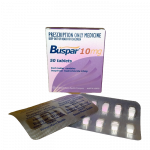Does Buspirone Work Immediately?

When our body begins to metabolize a medication, different organs process the ingredients before they are finally released into the bloodstream. While the process may sound straightforward, different drugs dissolve at different rates, different formulas, and dosages break down differently – and, everybody’s body metabolizes medication uniquely. These are just a few of the many complexities behind the nature of drug absorption and metabolism.
The vast majority of drugs are taken orally and are broken down within the gastrointestinal tract. Once the medication arrives, it is broken down by stomach acids before it passes through the liver and then enters the bloodstream. Certain medications may stay in the bloodstream longer – it all depends on the dosage and drug family consumed.
There are several factors at play when determining the overall time required for medication to be fully digested. The following factors all impact an individual’s sensitivity to and absorption of medication:
• Age
• Weight
• Gender
• Time of day taken
• Level of physical activity
• Level of stress
• Content of stomach and PH level
• Presence of other medications.
Gastric acids may prevent or slow the breakdown of certain medications. Additionally, when a medication is metabolized in the liver, its potency will decrease along with its effectiveness before the medicine reaches the bloodstream.
What is buspirone?
Buspirone is an anti-anxiety medicine that affects chemicals in the brain that may be unbalanced in people with anxiety. Buspirone is used to treat symptoms of anxiety, such as fear, tension, irritability, dizziness, pounding heartbeat, and other physical symptoms.
Buspirone is not an anti-psychotic medication and should not be used in place of medication prescribed by your doctor for psychotic disorders. The medication is available as Buspar, Buspar Dividose, and Vanspar. Generic versions are also available.
Buspirone mechanism of action
Buspirone is in a class of medications called anxiolytics. It works by changing the amounts of certain natural substances in the brain. It’s not fully known how buspirone lowers anxiety levels. It decreases some of the activity of a chemical called serotonin in the brain. This decrease is thought to affect anxiety.
How should I take Buspirone?
Buspirone is taken by mouth, usually 2 or 3 times a day or as directed by your doctor. The typical starting dose of buspirone is 15 mg by mouth twice daily. The maximum dose is 60 mg per day. Your doctor may start you on a low dose of buspirone and gradually increase your dose, not more often than once every 2 to 3 days. It may take several weeks before you reach a dose that works for you.
You may take this medication with or without food, but it is important to choose one way and always take it the same way so that the amount of drug absorbed will always be the same.
Buspirone may come in a tablet that can be split to get the correct dose for you. Follow the manufacturer’s Patient Instruction Sheet or ask your pharmacist how to split the tablet to get your dose.
Avoid eating grapefruit or drinking grapefruit juice while taking this medication unless your doctor or pharmacist says you may do so safely. Grapefruit can increase the chance of side effects with this medicine. Ask your doctor or pharmacist for more details.
Use this medication regularly in order to get the most benefit from it. To help you remember, use it at the same times each day. When this medication is started, symptoms of anxiety (such as restlessness) may sometimes get worse before they improve. It may take up to a month or more to get the full effect of this medication.
Does Buspirone Work Immediately?
No, buspirone has a delayed onset of action and does not exert its anxiolytic effects immediately. It can take between 2–4 weeks to feel the full effects of the medication after the first dose.
Nevertheless, after an oral dose of buspirone, the medication is rapidly absorbed, reaching peak plasma concentration (Cmax) in under 1 hour. Do not stop taking buspirone if you don’t feel the effects of the medication immediately because even though the drug has a lower risk of withdrawal symptoms when compared to other antianxiety medications, it is still possible to experience those symptoms if you stop taking buspirone suddenly.
Buspirone oral tablet is used for short-term or long-term treatment. The length of therapy depends on the condition being treated. This drug comes with risks if you fail to take it as prescribed.
Does Buspirone Work faster than Xanax?
No, Xanax works faster than buspirone, you can feel the effects of Xanax within an hour and the medicine reaches peak concentrations in the body after one to two hours. Xanax provides fast relief of anxiety symptoms because it works specifically by binding to GABA receptors in your brain. This slows down your brain activity and has the effect of reducing anxiety, fear, and feelings of terror.
What side effects can buspirone cause?
Buspirone may cause side effects. Tell your doctor if any of these symptoms are severe or do not go away:
• dizziness
• nausea
• diarrhea
• headache
• excitement
• confusion
• fatigue
• nervousness
• difficulty falling asleep or staying asleep
• feelings of anger or hostility
• lightheadedness
• headache
• weakness
• numbness
• increased sweating
Some side effects can be serious. If you experience any of these symptoms, call your doctor immediately:
• rash
• hives
• itching
• swelling of the face, eyes, mouth, throat, tongue, or lips
• fast or irregular heartbeat
• blurred vision
• uncontrollable shaking of a part of the body
• agitation, fever, sweating, dizziness, flushing, confusion, fast or irregular heartbeat, shivering, severe muscle stiffness or twitching, seizures, hallucinations, loss of coordination, nausea, vomiting, or diarrhea
If you experience a serious side effect, you or your doctor may send a report to the Food and Drug Administration’s (FDA) MedWatch Adverse Event Reporting program online (http://www.fda.gov/Safety/MedWatch) or by phone (1-800-332-1088).





